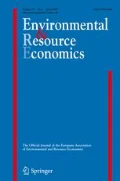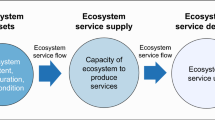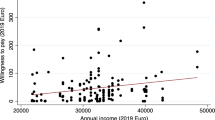Abstract
There has long been interest in integrating the value of environmental stocks and flows into standard measures of economic activity and wealth, in particular through the development of adjusted measures of GDP and extended measures of national wealth. This paper examines how the valuation of ecosystem services and ecosystem assets can be undertaken in an integrated national accounting setting. We clarify the relevant valuation principles, most significantly the need to apply the concept of exchange values, and explain why the integration of ecosystem services necessitates an extension of the standard production boundary used in economic measurement. The main implications of an accounting approach are discussed including the need to distinguish benefits from services, the need for valuation methods that exclude consumer surplus, and the importance of aligning measures of income and degradation. Remaining challenges include the treatment of low or negative rents, accounting for ecosystem disservices, and the derivation of values for ecosystem assets. Meeting these challenges and advancing work in this area should be the joint focus of economists, ecologists and accountants.

Similar content being viewed by others
Notes
Interestingly though, at the time, these debates on welfare were not overly concerned with the state of the environment. For instance, Nordhaus and Tobin (1972) state: “If we had estimates of the value of environmental capital, we could add them to the national wealth estimates \(\ldots \,\) and modify our calculations of MEW [measure of economic welfare] net investment accordingly. We have not been able to make this, adjustment, but given the size of the other components of wealth, we do not believe it would be significant.”
For a catalogue of examples of environmental–economic accounting see the on-line library held by the United Nations Statistics Division at http://unstats.un.org/unsd/envaccounting/ceea/archive/.
While this concept is clear, its application in the case of the use of environmental assets is challenging. See the discussion on the distinction between natural and cultivated resources in SEEA Central Framework 5.24–5.29.
Unlike the SEEA 2012 Central Framework which was recognized as a statistical standard by the United Nations Statistical Commission, SEEA Experimental Ecosystem Accounting does not represent a standard for measurement. Nonetheless it is hoped that it can provide an integrated framework and baseline for discussion on ecosystem accounting research, and facilitate the transition of this research into broader economic accounting systems and related decision making tools.
There are many challenges in defining a set of mutually exclusive areas. For discussion see SEEA EEA Sect. 2.3.
Similar terms are used for the same model in other cases. For example, the UK NEA and Bateman et al. (2011) use ecosystem services in the same way but apply the term “goods” rather than “benefits”. Other approaches may skip the step of benefits (as defined here) and rather consider a direct link between ecosystem services and human well-being. The “extra” step is considered important for national accounting purposes such that integration with (and extension beyond) standard economic measures can be more easily facilitated.
Abbreviations
- CICES:
-
Common International Classification of Ecosystem Services
- EC:
-
European Commission
- GDP:
-
Gross domestic product
- MA:
-
Millennium Ecosystem Assessment
- NEA:
-
National Ecosystem Assessment
- SEEA:
-
System of Environmental–Economic Accounting
- SEEA EEA:
-
System of Environmental–Economic Accounting 2012 Experimental Ecosystem Accounting
- SNA:
-
System of National Accounts
- TEEB:
-
The Economics of Ecosystems and Biodiversity
- UN:
-
United Nations
- UK:
-
United Kingdom of Great Britain and Northern Ireland
- WCED:
-
World Commission on Environment and Development
References
Ahmad YJ, El Serafy S, Lutz E (eds) (1989) Environmental accounting for sustainable development. World Bank, Washington
Alfsen KH, Bye T, Lorentsen L (1987) Natural resource accounting and analysis. The Norwegian experience 1978–1986. Social and economic studies no. 65. Statistics Norway, Oslo
Arrow K, Dasgupta P, Mäler K-G (2003) Evaluating projects and assessing sustainable development in imperfect economies. Environ Resour Econ 26(4):647–685
Arrow K, Dasgupta P, Goulder LH, Mumford KJ, Oleson K (2012) Sustainability and the measurement of wealth. Environ Dev Econ 17(3):317–353
Ayres RU, Kneese AV (1969) Production, consumption, and externalities. Am Econ Rev 69:282–297
Banzhaf S, Boyd J (2012) The architecture and measurement of an ecosystem services index. Sustainability 4:430–461
Barbier E (2013) Wealth accounting, ecological capital and ecosystem services. Environ Dev Econ 18(2):133–161
Barbier E (2014) Challenges to ecosystem service valuation for wealth accounting. Chapter 7 in UNU-IHDP and UNEP. Inclusive Wealth Report 2014. Measuring progress toward sustainability. Cambridge University Press, Cambridge, pp 159–177
Bateman IJ, Mace GM, Fezzi C, Atkinson G, Turner K (2011) Economic analysis for ecosystem service assessment. Environ Resour Econ 48:177–218
Bateman IJ, Harwood AR, Mace GM, Watson RT et al (2013) Bringing ecosystem services into economic decision-making: land use in the United Kingdom. Science 341:45–50
Brander LM, Florax RJG, Vermaat JE (2005) The empirics of wetland valuation: a comprehensive summary and a meta-analysis of the literature. Environ Resour Econ 33:223–250
Brouwer R, Barton D, Bateman I, Brander L, Georgiou S, Martín-Ortega J, Navrud S, Pulido-Velazquez M, Schaafsma M, Wagtendonk A (2009) Economic valuation of environmental and resource costs and benefits of water uses and services in the water framework directive: technical guidelines for practitioners
Campos P, Caparrós A (2011) RECAMAN PROJECT Mediterranean Monte Ecosystems total income green accounting. Presentation to the Expert Meeting on Ecosystem Accounting, May 2011. European Environment Agency, Copenhagen
Cobb C, Halstead T, Rowe J (1995) If the GDP is up, why is America down? Atl Mon 276:59–78
Comisari P, Vardon M (2013) Valuation and treatment of water resource stocks. Paper presented to the 19th meeting of the London Group of Experts on Environmental Accounting, London, 12–14 Nov 2013
Commission interministérielle des comptes du patrimoine naturel, Ministère de l’environnement (1981–1983), Institut national de la statistique et des études économiques (INSEE) (1986) Les Comptes du Patrimoine Naturel. Collections de l’INSEE. Série C, comptes et planification, 137–138. INSEE, Paris
Convention on Biological Diversity (2010) Strategic plan for biodiversity, pp 2011–2020. http://www.cbd.int/sp/targets/
Costanza R, d’Arge R, de Groot R, Farber S, Grasso M, Hannon B, Limburg K, Naeem S, O’Neill RV, Pareulo J, Raskin RG, Sutton PC, van den Belt M (1997) The value of the world’s ecosystem services and natural capital. Nature 387:253–260
Costanza R, de Groot R, Sutton PC, van der Ploeg S, Anderson S, Kubiszewski I, Farber S, Turner RK (2014) Changes in the global value of ecosystem services. Glob Environ Change 26:152–158
Dasgupta PS (2009) The welfare economic theory of green national accounts. Environ Resour Econ 42(1):3–38
Dasgupta PS, Heal GM (1974) The optimal depletion of exhaustible resources. In: Review of economic studies, Symposium on the economics of exhaustible resources
Daly H, Cobb J (1989) For the common good. Beacon Press, Boston
Edens B, Hein L (2013) Towards a consistent approach for ecosystem accounting. Ecol Econ 90:41–52
Edens B, Graveland C (2014) Experimental valuation of Dutch water resources according to SNA and SEEA. doi:10.1016/j.wre.2014.10.003
European Commission, International Monetary Fund, Organisation for Economic Co-operation and Development, United Nations, World Bank (2009) System of National Accounts 2008. United Nations, New York
Folke C, Carpenter S, Walker B, Scheffer M, Elmqvist T, Gunderson L, Holling CS (2004) Regime shifts, resilience, and biodiversity in ecosystem management. Annu Rev Ecol Evol Syst 35:557–581
Haines-Young R, Potschin M (2013) Common International Classification of Ecosystem Services (CICES): consultation on version 4, Aug–Dec 2012. EEA Framework Contract No. EEA/IEA/09/003
Harrison A (1993) The draft handbook and the UNSTAT framework: comments. In: Lutz E (ed) Toward improved accounting for the environment. World Bank, Washington
Hartwick JM (1977) Intergenerational equity and the investing of rents from exhaustible resources. Am Econ Rev 66:972–974
Heal G, Kriström B (2005) Chapter 22: National income and the environment. Handbook of environmental economics, vol 3. Elsevier North-Holland, Amsterdam, pp 1147–1217
Hicks JR (1946) Value and capital: an inquiry into some fundamental principles of economic theory. Clarendon Press, Oxford
Hicks JR (1975) The scope and status of welfare economics. Oxf Econ Pap 3:307–326
Hill RJ, Hill TP (2003) Expectations, capital gains and income. Econ Enq 41(4):607–619
Hooper DU, Chapin FSIII, Ewel JJ, Hector A, Inchausti P, Lavorel S, Lawton JH, Lodge DM, Loreau M, Naeem S, Schmid B, Setälä H, Symstad AJ, Vandermeer J, Wardle DA (2005) Effects of biodiversity on ecosystem functioning: a consensus of current knowledge. Ecol Monogr 75:3–35
Hueting R (1980) New scarcity and economic growth. North-Holland, Amsterdam
Kosoy N, Corbera E (2010) Payments for ecosystem services as commodity fetishism. Ecol Econ 69(1):1228–1236
Kuznets S (1954) Economic change. Heinemann, London, pp 192–215
Mäler K-G, Aniyar S, Jansson Å (2009) Accounting for ecosystems. Environ Resour Econ 42:39–51
Meadows DH, Meadows DL, Randers J, Behrens WW (1972) Limits to growth. Reports for the Club of Rome. Potomac Associates Book, Washington
Millennium Ecosystem Assessment (2003) Ecosystems and human well-being: a framework for assessment. Island Press, Washington
Millennium Ecosystem Assessment (2005) Volume I: Ecosystems and human well-being: current state and trends. Island Press, Washington
National Research Council (2005) Valuing ecosystem services: toward better environmental decision making. National Academy Press, Washington
Nordhaus WD (2005) Principles of national accounting for non-market accounts. Revised 5 Jan 2005. Paper presented to the Conference on research in income and wealth (CRIW): a new architecture for the US National Accounts, pp 16–17, April 2004
Nordhaus WD, Tobin J (1972) Is growth obsolete?. Columbia University Press, New York
Pezzey JCV, Toman MA (2002) The economics of sustainability: a review of journal articles. Resources for the Future, Wasington
Press Information Bureau, Government of India (2013) Executive summary of ‘Green National Accounts in India a Framework—Report of the Expert Group’. http://pib.nic.in/archieve/others/2013/apr/d2013040501.pdf
Radermacher W, Steurer A (2014) Do we need natural capital accounts, and if so, which ones? Paper presented to the High Level Expert Group on the Measurement of Economic Performance and Social Progress, Rome, Sept 2014
Remme RP, Schröter M, Hein L (2014) Developing spatial biophysical accounting for multiple ecosystem services. Ecosyst Serv 10:6–18
Scheffer M, Carpenter S, Foley JA, Folke C, Walker B (2002) Catastrophic shifts in ecosystems. Nature 413:591–596
Schröter M, Barton DN, Remme RP, Hein L (2014) Accounting for capacity and flow of ecosystem services: a conceptual model and a case study for Telemark, Norway. Ecol Ind 36:539–551
Solow RM (1974) Intergenerational equity and exhaustible resources. Rev Econ Stud Symp Econ Exhaustible Resour 41:29–46
Soma K (2006) Natura economica in environmental valuation. Environ Values 15(1):31–50
Sumarga E, Hein L (2014) Mapping ecosystem services for landscape planning, the case of Central Kalimantan. Environ Manag 54(1):84–97
TEEB (2010) The Economics of Ecosystems and Biodiversity: mainstreaming the economics of nature. A synthesis of the approach, conclusions and recommendations of TEEB. Routledge
UK National Ecosystem Assessment (2011) The UK National Ecosystem Assessment: synthesis of the key findings. UNEP-WCMC, Cambridge
United Nations (1992) Agenda 21: Programme of action for sustainable development. In: United Nations conference on environment and development, Rio de Janeiro, 3–14 June 1992. United Nations, New York
United Nations (1993) Handbook of national accounting: integrated environmental and economic accounting, Interim version. Studies in methods, series F, no. 61. United Nations, New York
United Nations (2014) Open working group proposal for sustainable development goals. Document A/68/970
United Nations General Assembly (2012) The future we want. Resolution 66/288, 27 July 2012
United Nations, European Commission, International Monetary Fund, Organisation for Economic Co-operation and Development, World Bank (1993) System of National Accounts 1993. United Nations, New York
United Nations, European Commission, Food and Agricultural Organization of the United Nations, International Monetary Fund, Organisation for Economic Co-operation and Development, The World Bank (2014a) System of Environmental–Economic Accounting 2012—central framework. United Nations, New York
United Nations, European Commission, Food and Agricultural Organization of the United Nations, Organisation for Economic Co-operation and Development, The World Bank (2014b) System of Environmental–Economic Accounting 2012—experimental ecosystem accounting. United Nations, New York
UNU-IHDP, UNEP (2014) Inclusive Wealth Report 2014. Measuring progress toward sustainability. Cambridge University Press, Cambridge
Vanoli A (1995) Reflections on environmental accounting issues. Rev Income Wealth 41(2):113–137
Vanoli A (2005) A history of national accounting. IOS Press, Amsterdam
Walker B, Pearson L, Harris M, Mäler K-G, Li C-Z, Biggs R, Baynes T (2010) Incorporating resilience in the assessment of inclusive wealth: an example from south-east Australia. Environ Resour Econ 45(2):183–202
Weber J-L (2012) Recording ecological debts in the national accounts: possibilities open by the development of ecosystem capital accounts. Paper submitted to the ISEE2012 conference, Rio de Janeiro
Weitzman ML (1976) On the welfare significance of national product in a dynamic economy. Q J Econ 90(1):156–162
World Bank (2011) The changing wealth of nations. World Bank, Washington
World Commission on the Environment and Development (1987) Our common future. Oxford University Press, Oxford
Acknowledgments
This paper reflects and builds on the outcomes of technical discussions held in the context of the development of the SEEA Experimental Ecosystem Accounting. The three authors were members of the editorial board established by the United Nations Committee of Experts on Environmental–Economic Accounting to oversight that technical work and acknowledge the contributions of other technical experts involved. We also thank two anonymous reviewers for their valuable comments.
Author information
Authors and Affiliations
Corresponding author
Additional information
The views expressed in this paper are those of the author and do not necessarily reflect the policies of Statistics Netherlands.
Rights and permissions
About this article
Cite this article
Obst, C., Hein, L. & Edens, B. National Accounting and the Valuation of Ecosystem Assets and Their Services. Environ Resource Econ 64, 1–23 (2016). https://doi.org/10.1007/s10640-015-9921-1
Accepted:
Published:
Issue Date:
DOI: https://doi.org/10.1007/s10640-015-9921-1




